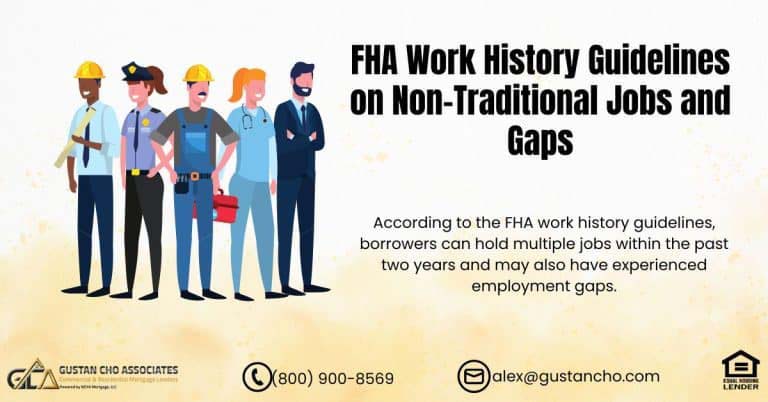This guide covers how recent increase in income is viewed by mortgage underwriters. Depending on mortgage underwriters, W-2 income is calculated in various ways. Mortgage lenders require two years of employment history. This does not mean borrowers needs to have worked for two years at the same company. Dale Elenteny, a senior mortgage loan originator at Gustan Cho Associates says the following about how recent increase in income is viewed by mortgage underwriters.
Homebuyers can have various jobs with different companies in the past two years. Borrowers are allowed to qualify for mortgage with job gaps in the past two years.
Some mortgage lenders, especially banks and credit unions, will have their own lender overlays. This is where they will require two years of continuous work history with the same employer. But this is not a mandatory Fannie Mae or HUD lending guidelines. Mortgage lenders do require two years worth of tax returns as well as two years W-2s as well as the most recent paycheck stubs. In the following paragraphs, we will cover how recent increase in income is viewed by mortgage underwriters.
How Mortgage Underwriters View a Recent Jump in Your Income
See how mortgage underwriters interpret a recent income boost when you apply for a home loan. Discover what paperwork you need, how it affects your debt-to-income ratio, and expert tips for a stronger application.
How Underwriters Evaluate Your Recent Income Growth
How much you earn is a big deal when you apply for a mortgage. An increase in income sounds great, but it can also make underwriters pause. They want to know if this new pay level is here to stay. Their job is to ensure you can keep up with your mortgage for the long haul.
The Good and the Not-So-Good
On the plus side, a higher income can lower your debt-to-income (DTI) ratio, which might help you qualify for a bigger loan. The flip side is that if the boost came from a one-time bonus or an overtime push, underwriters might doubt its permanence. They need proof that the new income is steady and that you can count on it for the entire mortgage term.
Got a Raise? Here’s How Underwriters See It
An income boost can help your mortgage approval — but only if you know how to present it.
What Docs Do Underwriters Need to Back Up a Pay Boost?
When you get a bump in pay and want to show it to get a mortgage, underwriters usually want:
- The latest pay stubs show the higher pay.
- W-2 forms for the current year and the two years before that.
- A written note from your boss that confirms the raise or new title.
- Tax returns are extra important if you work for yourself or earn commissions.
- Recent bank statements that show the new pay dropping into your account
Suppose you collect and send these items clearly and completely. In that case, underwriters are more likely to trust that your finances are in good shape.
How a Pay Bump Changes Your Debt-to-Income Ratio
The debt-to-income (DTI) ratio is the total of your monthly bills divided by your gross pay. When your pay increases, this number decreases, which is good for getting a loan. If your bills also go up or the new pay isn’t on paper, the underwriter might not count the raise the way you want.
Extra Rules for Self-Employed Borrowers
If you’re self-employed, your pay can bounce around a lot. Underwriters usually look at two years of your income to get an average. If you’ve had a recent jump, they will dig into your tax returns and current profit-and-loss statements to ensure it’s a trend, not a lucky month.
Strengthening Your Mortgage Application After a Pay Raise
- Send all requested paperwork in full and on time.
- Write a brief letter explaining why your income increased (like a promotion or a new job).
- Refrain from taking on new debts or applying for new credit; these can cancel out your income improvement.
- Stick with the same job and stable pay for a few months before you apply.
If you follow these tips, underwriters are more likely to see your income bump as a strong plus.
Frequently Asked Questions (FAQs) on Recent Increase in Income
Q1: Does a Recent Pay Raise Allow Me to Borrow More Money?
Yes! A higher paycheck lowers your debt-to-income ratio, which may let you secure a bigger mortgage. Just be ready to prove the raise is stable.
Q2: How Long Should I Wait to Apply After a Pay Raise?
Different lenders have different rules, but many like to see the new income for 2-3 months, shown on pay stubs and with a note from your employer.
Q3: What if My Raise Came From Bonuses or Commissions?
Lenders usually see these as changeable income, so they’ll likely average them over two years. Being steady and having good records is very important.
Q4: Will Moving to a Job With a Higher Salary Change My Mortgage Approval Chances?
Getting a job that pays more usually helps, but mortgage underwriters care a lot about job stability. If you move to a different company, they’ll want to see that you’ve stayed in the field for at least a year. If you get a raise with a promotion at the same company, that’s a smoother path, since it shows you’ve already proven yourself there.
Q5: How Can Self-Employed People Show a Higher Income Now?
Self-employed borrowers must turn in the last couple of years of tax returns, a profit and loss statement showing the last year, and recent bank statements. Lenders look for steady increases over two years to feel confident that the higher income will stick around.
Knowing what lenders are looking for can boost your approval odds if you’re getting ready to apply for a mortgage and your income has just increased. Reach out to us for personalized mortgage advice and support today!
Borrowers Who Go From Part-Time too Full Time Recently
What happens if an employee started out with a company part-time, then eventually went to full time, and then got a promotion recently with a recent increase in income. If all this happened in the past two years and the employee did not have an employment gap, the new recent income increase will be used as qualified income.
On this case scenario, the employee’s previous wages were steadily increasing. So it is obvious that one year of W-2 earnings was substantially less than the most recent W-2 earnings.
With the recent increase in income, the underwriter will base the most recent increase in income as the income to qualify the borrower. An offer employment letter and written verification of employment will be required.
Higher Income, Bigger Home?
See how underwriters treat recent income increases and what it means for your buying power.
Don’t Mortgage Underwriters Average the Past 2 Years W-2s?
Many homebuyers who had irregular jobs or recent increase in income think they do not qualify for a mortgage loan because they believe underwriters averages their two years wages. That is the case with 1099 wage earners or self-employed wage earners but not with W-2 wage earners. Let’s take an example of a recent mortgage loan I closed:
- Borrower A has a credit score of 587.
- Since his credit scores were under 620, the maximum debt to income ratio allowed under FHA guidelines is capped at 43% DTI to get an approve/eligible per Automated Underwriting System Approval.
- If his credit scores were over 620, the maximum DTI allowed on FHA loans would have been 46.9% front-end and 56.9% back-end.
Case Scenario on Borrower Qualifying for an FHA Loan
Borrower A worked for XYZ Company in 2023 and 2024 full time and made $10.00 per hour.
- In January 2025, Borrower A changed jobs to ABC Company as a part-time employee and made $12.00 per hour.
- However, due to the hard work Borrower A did for ABC Company, the company changed Borrower A’s part-time status to full time in April 2025 and his new full-time hourly rate was now $17.00 per hour.
- What income will the mortgage loan underwriter use to qualify Borrower A?
- The answer to this question is that the mortgage lender will go off the $17.00 per hour wage in qualifying this borrower’s mortgage loan application.
- The underwriter needs to confirm via a written verification of employment that the current status of Borrower A’s employment is a full time.
- Also, the borrower needs VOE that his employment is likely to continue for the next 3 years.
- 30 days of paycheck stubs will be required prior to closing from the date of the start date of his new full-time position.
- The previous 2 years of irregular income does not come into play in this case scenario.
Recent Increase in Income Due To Promotion
Mortgage Borrowers who could not qualify for a mortgage loan before because of high debt to income ratios and have had a recent increase in income due to promotion or a job transfer can now qualify. The day borrowers get a recent increase in income is the day they can apply for a mortgage loan application. However, borrowers cannot close on mortgage loan until they have provided the underwriter with 30 days paycheck stubs on new position.
Income Boost? Here’s the Mortgage Math
Understand how lenders calculate your qualifying income after a raise.








